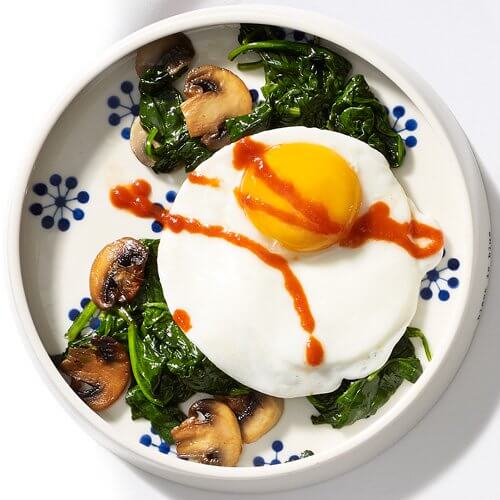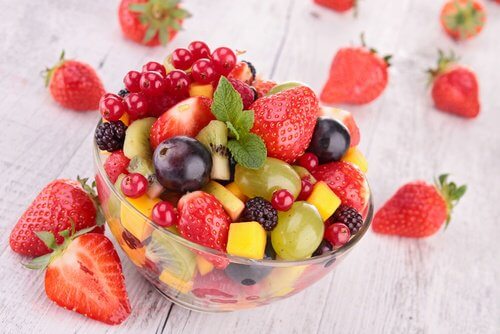The Foods You Probably Should (and Shouldn't) Eat on an Empty Stomach


Reviewed and approved by the pedagogue in physical education and nutritionist Elisa Morales Lupayante
What do you normally eat for an empty stomach? People don’t always choose good breakfast foods.
After all, many of us eat the fastest or easiest thing to make in the mornings before rushing out to take on our daily obligations. However, the best thing to do is take the time and deliberately plan the first thing you’ll put in your mouth each day.
You should think about how you’re going to get the energy that you need for your activities. You should also think about the benefits food has for your body and which vitamins and minerals it gives to you.
If you don’t have a clear idea of what you probably should and shouldn’t eat on an empty stomach, keep reading. We’ll give you some suggestions.
9 foods you probably should eat on an empty stomach
When you’re going to eat on an empty stomach, it’s important that you eat natural products that give you complex nutrients.
Some good options are:
1. Oat flour
Oat flour gives you soluble fiber. This may help you to:
- Have better digestion.
- Reduce cholesterol levels in your blood.
- Enjoy feeling full for a longer time.
- Make a stomach lining that may protect you from the hydrochloric acid you make to digest foods.
2. Eggs

Eggs are recommended because they have very healthy protein. You can eat them in casseroles, poached, fried, or scrambled. However, always limit the fat you use when you make them.
3. Blueberries
These are one of the most recommended and healthiest fruits out there. They may help improve your memory and circulation. They also may help lower your blood pressure.
We suggest you eat them for breakfast in a fruit salad, with yogurt, or with cereal.
4. Walnuts
They’re rich in selenium and they may help reduce your stomach acid by balancing its pH level. This may reduce the likelihood of suffering from ulcers. Remember to not eat more than five whole nuts per day. You can chop them and add them to your cereal or oatmeal.
5. Papaya
This fruit has an enzyme called papain. Papain is good for encouraging good digestion and may reduce the risk of suffering from colon cancer. Also, it’s rich in fiber and vitamins E and C. These may help protect from free radicals. The best thing to do is to eat a cup of papaya at least three times per week.
6. Buckwheat flour
Eating it on an empty stomach is a great help for your body. This is because it’s rich in protein, iron, and vitamins.
This article may interest you: Gluten-free Buckwheat Rice Bread: Easy and Delicious
You can add it to smoothies, make crepes with it, or add it to another cereal.
7. Wheat germ
Only two tablespoons per day may contribute to your digestive system’s functions. It also gives you:
- 15% of the daily recommended amount of vitamin E.
- 10% of the daily recommended amount of folic acid.
It’s a good alternative to conventional cereals that are usually saturated with sugars and chemical conservatives.
8. Whole grains without leavening
It’s wise to eat them in the morning. This way, their complex carbohydrates can be burned throughout the day.
9. Fruit

Breakfast is the best time to eat a lot of fruit. The reason is that they’re rapidly digested. As a result, they may benefit you without sitting in your stomach for long.
Foods that you probably shouldn’t eat on an empty stomach
Tomatoes
This food should be avoided on an empty stomach. This is because its high tannic acid contents may increase your stomach acid. As a result, it may worsen symptoms of heartburn. It’s a good idea to leave it for other meals.
Coffee or tea
Drinking tea on an empty stomach may cause nausea and stomach discomfort. Drinking coffee tends to increase your stomach’s acidity. This can worsen heartburn and gastritis worse.
If you need to drink tea, choose the ones that may reduce your risks of the problems we mentioned. These teas include mint or chamomile.
Pastries
This is usually a common option for breakfast. However, the truth is that it’s not a good idea to eat them a lot the first few hours of the morning. Since they have leavening, they may irritate your stomach and cause gas.
Citrus fruits and juices

It’s best to avoid citrus fruits first thing in the morning. This is due to the fact that they’re acidic and may cause heartburn and stomach problems.
If you want to drink citrus juices, make sure that you don’t do it every day.
Soda
Sodas and carbonated drinks don’t just lead to obesity. Carbonated drinks may also damage the mucosa membranes in your stomach. This reduces its blood supply and may lead to slow digestion and even constipation.
Always go for healthy and natural choices
As you can see, it’s not hard to keep a healthy diet.
Choose the foods that encourage your digestion and the ones that will help keep your stomach acid at normal levels. In addition, make sure to eat foods that give you the necessary daily amounts of vitamins.
Read more here: The Healthiest Breakfast Foods You Can Eat
This means some initial planning while you’re adapting to including and preparing any food you choose. Even though it’s a radical change, you may benefit from this.
Main image courtesy of ©wikiHow.com
All cited sources were thoroughly reviewed by our team to ensure their quality, reliability, currency, and validity. The bibliography of this article was considered reliable and of academic or scientific accuracy.
- Mahoney, C. R., Taylor, H. A., Kanarek, R. B., & Samuel, P. (2005). Effect of breakfast composition on cognitive processes in elementary school children. Physiology and Behavior. https://doi.org/10.1016/j.physbeh.2005.06.023
- Schroeder, N., Gallaher, D. D., Arndt, E. A., & Marquart, L. (2009). Influence of whole grain barley, whole grain wheat, and refined rice-based foods on short-term satiety and energy intake. Appetite. https://doi.org/10.1016/j.appet.2009.07.019
- Krikorian, R., Shidler, M. D., Nash, T. A., Kalt, W., Vinqvist-Tymchuk, M. R., Shukitt-Hale, B., & Joseph, J. A. (2010). Blueberry supplementation improves memory in older adults. Journal of Agricultural and Food Chemistry. https://doi.org/10.1021/jf9029332
This text is provided for informational purposes only and does not replace consultation with a professional. If in doubt, consult your specialist.








